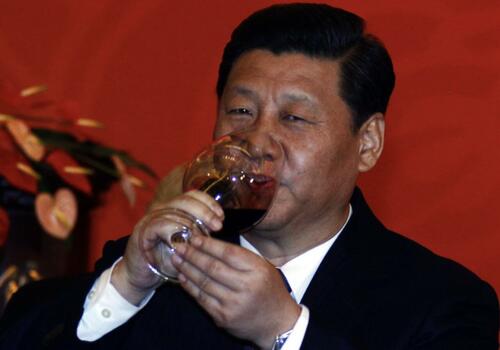The Xi Jinping administration has revised a widely criticized “alcohol ban” on government and party officials after backlash over its economic impact and excessive enforcement, according to Nikkei.
The slight policy adjustment was announced through three key state media outlets, often referred to as the “throat and tongue” of the Chinese Communist Party.
On June 17, People’s Daily Online emphasized that not all eating and drinking was banned—only indulgence in luxury food, alcohol, and cigarettes at official functions. State-run Xinhua followed on June 19, warning against a “one size fits all” crackdown, while the Qiushi Journal clarified on June 20 that “normal” dining and drinking are still permitted.
The ban, widely seen as an overreach, triggered a sharp drop in alcohol sales as civil servants across the country began avoiding restaurants out of fear. In some areas, officials were banned from dining out even privately or on weekends, and surveillance cameras were installed in restaurants to monitor their behavior. One civil servant was punished simply for accepting a bowl of noodles from a business contact.
Nikkei Asia writes that this policy shift reflects a rare, swift reversal from Xi’s leadership—especially when compared to the drawn-out rollback of the zero-COVID policy, which remained in place despite economic damage and was only lifted at the end of 2022.
The ban’s origins trace back to March, when the Central Leading Group for Party Building, led by Politburo Standing Committee member Cai Qi, launched an education campaign to enforce Xi’s 2012 “eight-point rules” promoting frugality. The campaign, set to run through July, coincides with the lead-up to the Beidaihe meeting of senior and retired party leaders in August.
Cai Qi, one of Xi’s closest allies, oversees the group and also heads the party’s General Office and propaganda apparatus. Another Xi confidant, Li Xi, serves as deputy leader of the group and heads the party’s anti-graft agency.
Though the 2012 code does not ban alcohol, the campaign’s enforcement led to a de facto nationwide prohibition. The situation escalated after several civil servants died from alcohol poisoning at official banquets, prompting public anger and local overcorrections.
“Some local organizations overreacted,” the People’s Daily commentary noted, while Xinhua urged restraint and context. The revisions, announced in mid-May through the updated Regulations on Practicing Thrift and Opposing Waste, are seen as an effort to correct course without undermining Xi’s authority.
“The administration seems to have decided to prioritize shoring up domestic consumption over saving face,” a notable shift from past rigidity.
The controversy also unfolded just before the June 30 Politburo meeting, where officials announced new regulations for decision-making bodies like the Central Leading Group for Party Building. The move hinted at a subtle recalibration of centralized power in Beijing’s Zhongnanhai.
As one official media headline made clear, the ban wasn’t meant to target all alcohol consumption. But the overreach, like the zero-COVID measures before it, underscored how quickly Xi-era campaigns can ripple through China—often with unintended consequences.
Loading recommendations…


















